European Students Shoot for Stars at HEC-ESA Space Talks
This fall, HEC Paris hosted one of its most memorable events in years by welcoming three European Space Agency (ESA) astronauts - one of them live from space! - and thousands of students, entrepreneurs and space-related businesses. It was a high point of the 2019 European Space Talks campaign initiated by the ESA.
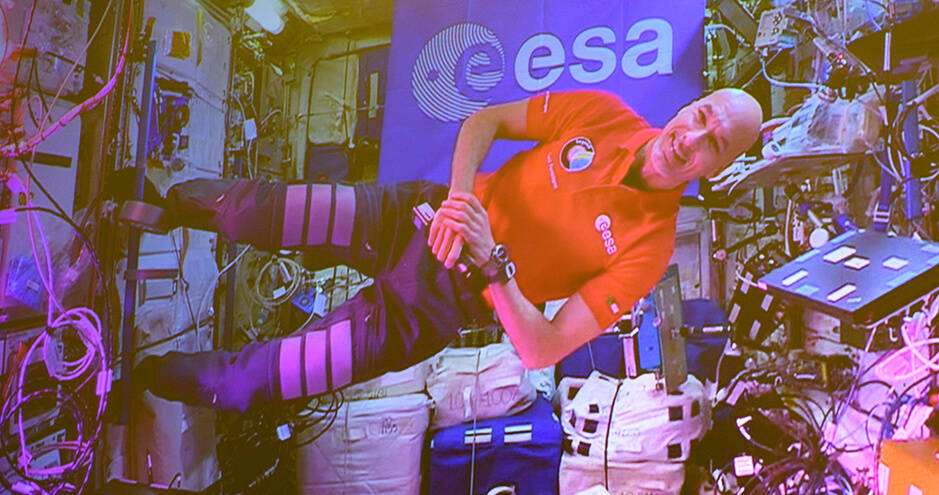
Christa McAuliffe once said: “Space is for everybody. It’s not just for a few people in science or math, or for a select group of astronauts. That’s our new frontier out there, and it’s everybody’s business to know about space.” The late American teacher and astronaut’s ghost seemed to float above the Hall d’Honneur on October 8, when 1,200 students, academics and entrepreneurs gathered to enjoy the words of Claudie Haigneré, Thomas Pesquet and Luca Parmitano. Haigneré captured the world’s imagination 23 years ago by becoming the first European civilian woman and scientist to fly into space. Pesquet spent six months on the International Space Station from November 2016 to June 2017, where Parmitano is currently on mission as the Station’s commander.
All three were united – the Italian astronaut via a live link to the ISS – together with ESA Director General Jan Wörner, for an evening during which students from across the continent could discuss Europe’s future in space. Why? In the run-up to ESA’s Ministerial Council meeting “Space19+” in November 2019, ESA is keen to hear what the younger generation think about the European space program. “We need you to impulse and drive our space exploration!” said ESA Director General Jan Wörner. “I will be talking to 22 Ministers from our Member States in November and I will be bringing your proposals to the table as we seek €12.5 billion to finance our new projects for the Moon and Mars.”
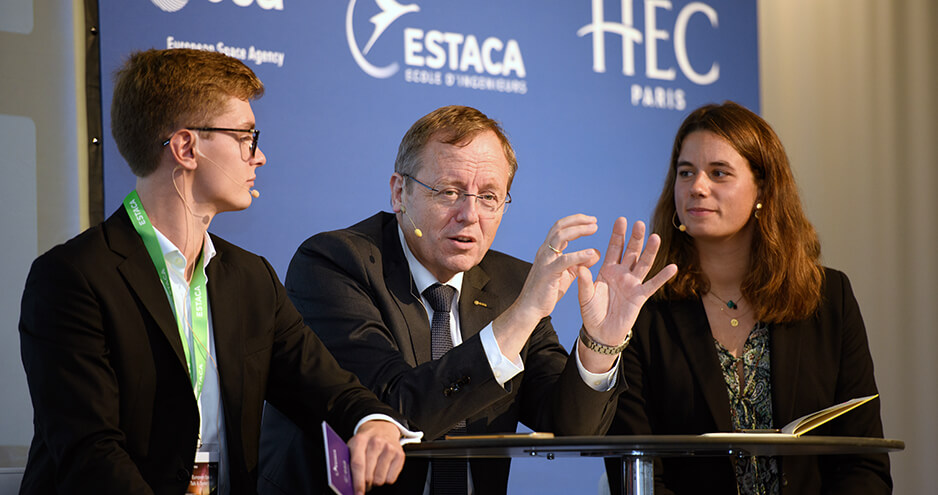
Opening up the Space Community
Wörner and the astronauts shared their messages and insights as part of a four-month campaign ESA has organized to raise the general public’s awareness about the role of space in our lives. “From June 21 to October 31, members of the European space family will be sharing their passion in a series of talks presenting a vast array of space-related topics.” The campaign coincided with the 50th anniversary of Apollo 11 first Moon landing.
One of the campaign’s highlights was this two-hour long exchange with European and North American students co-organised by HEC Paris, ESA and the ESTACA Engineering School. It was preceded by a careers fair featuring some of the industry’s top companies. Hundreds of students thronged the hall of T building to explore career opportunities before partaking in a roundtable beamed live to 25 European and North American universities.
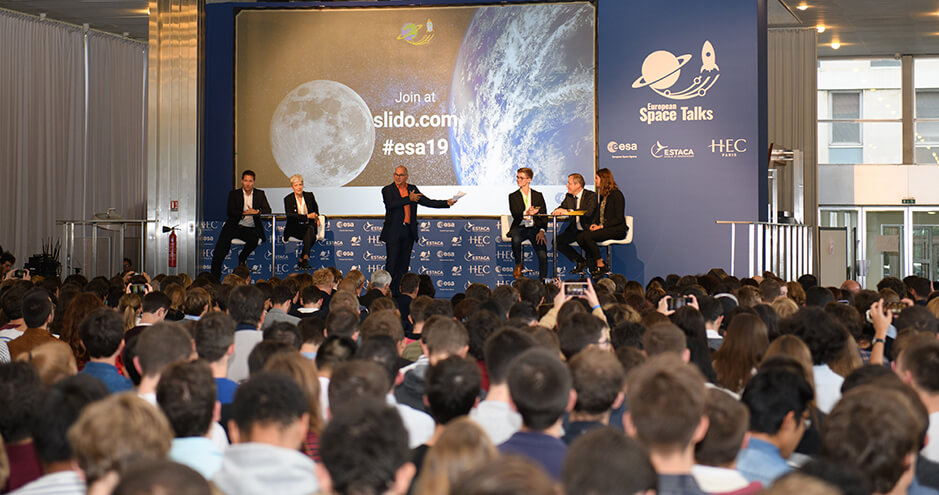
New Mindset
Echoing the words of Christa McAuliffe 34 years earlier, French astronaut Claudie Haigneré underlined the cross-disciplinary nature of space: “It is vital to incorporate new ways of thinking, new ideas,” she confided to HEC before the debate. “We need to work with faculties like HEC in this changing landscape and its shifts in paradigms. We must open our space community to new communities that will be part of that exploration in order to implement and advance our programs. It is also important to organize good professional relationships between students in engineering or management of complex systems, to regulate complex societies and become the decision-makers of the future. Space,” she concluded, “has global stakes, so it is vital that we find all the talents available to us.”
This notion was picked up by Luca Parmitano as he floated 400 kilometers above Earth. The ESA astronaut has been on his second mission called ‘Beyond’, since July 21 and was in fine fettle during the exchange with the audience. “We are currently flying over the South Pacific ascending the orbit in a northwesterly direction and will soon fly over Europe,” the Italian said before doing a somersault in the gravity-free space. “Our experiments in low Earth orbit will allow you, the next generation, to go farther. We need to know how to operate and survive on the Moon or Mars and this Station is an ideal environment to explore options.”
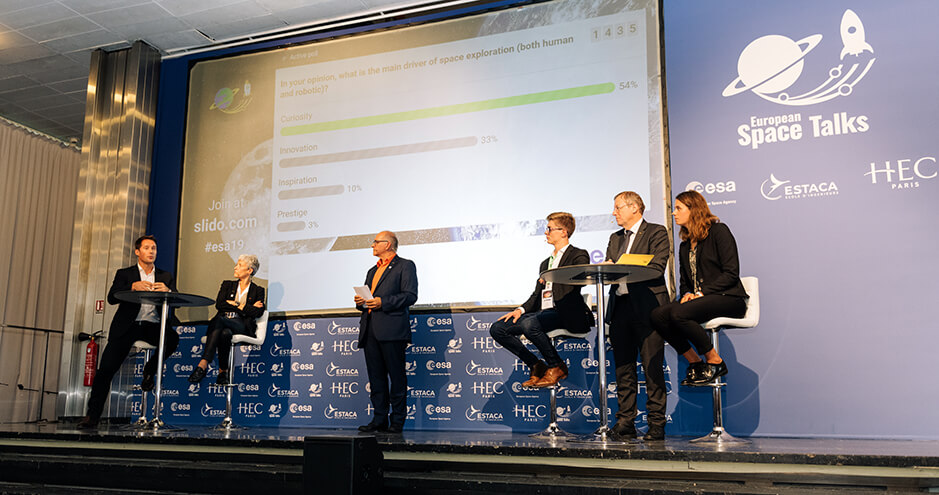
Humbling Experience
During the debate, the astronauts fielded questions and remarks onstage from students Lucas Gigot (ESTACA) and Anaïs Rostand (HEC) and ESA Head of Communications Philippe Willekens. “Tonight was a memorable plunge into a field we have all dreamed of at one time or another,” said HEC Master 1 student Anaïs Rostand after the debate. “I was impressed at how these space specialists made their scientific world accessible to us, yet they never stayed at a surface level. In many ways they threw down a gauntlet: our generation must take up space challenges at so many levels: climate change, space debris, cost, all these urgent questions were brought up.”
HEC Dean of Students Marcelle Laliberté reflected on the general buzz of excitement during the debate: “What an experience to be able to talk to the International Space Station,” she tweeted, “and to meet inspiring individuals who humbly say they are themselves inspired by the students’ energy and dreams of space!”
In addition to the discussion, the audience was asked to take part in an online poll, the results of which were projected on giant screens in real time in the Hall d’Honneur. “This participative approach is what the astronauts wanted most,” Willekens shared after the event. “It’s a step up from last year’s Space Talks. ESA is seeking to inspire a maximum number of students from all horizons. If 10% of those tuning in decide to pursue a space career we’ve more than achieved our goal.” The poll results will be processed and shared with the Ministers at the Ministerial Council meeting in Seville on November 27-28.
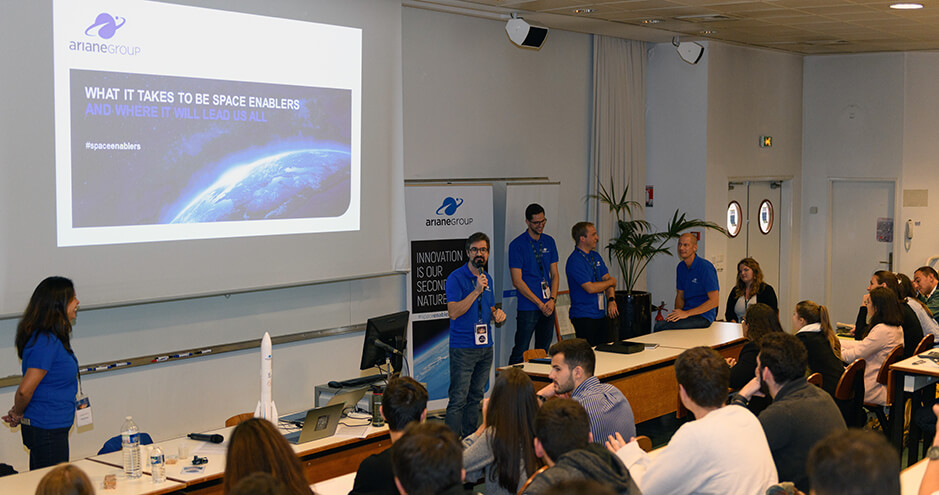
Strong Student Showing
Earlier in the day, a career forum in the HEC hall welcomed well-known companies (Airbus, Air Liquide, ArianeGroup, Dassault Aviation, Thales Alenia Space, ESA) and startups like Earth Cube and Unistellar. HEC alumni were present, having invested in the space sector over a long and consistent period: “There are 1,400 members of our space-related association,” said Thomas Reydellet, HEC aerospace, defense & security club, as well as being director of strategic prospective of Thalès. “We have more diversity than ever as space business cross-pollinates other sectors. Companies are now interested in geo-political issues, strategy, marketing and other disciplines which are disruptive. Environmental concerns have developed too, demands for re-usable launchers or ways of neutralizing space debris, for example.”
Students – including 400 who were bussed in from ESTACA - queued patiently to find out about job and internship opportunities available at the ten businesses present. Juliette and Julie are in their fifth and final year at IPSA. They shared their dreams of integrating this unique field: “I’m looking for an internship in space and orbital mechanics,” said the former. “I’m hoping to find an opening which works on the environmental space issues: 3,000 of the 4,500 satellites out there are not operational, there are almost a million large particles floating around! What do we do with them?”
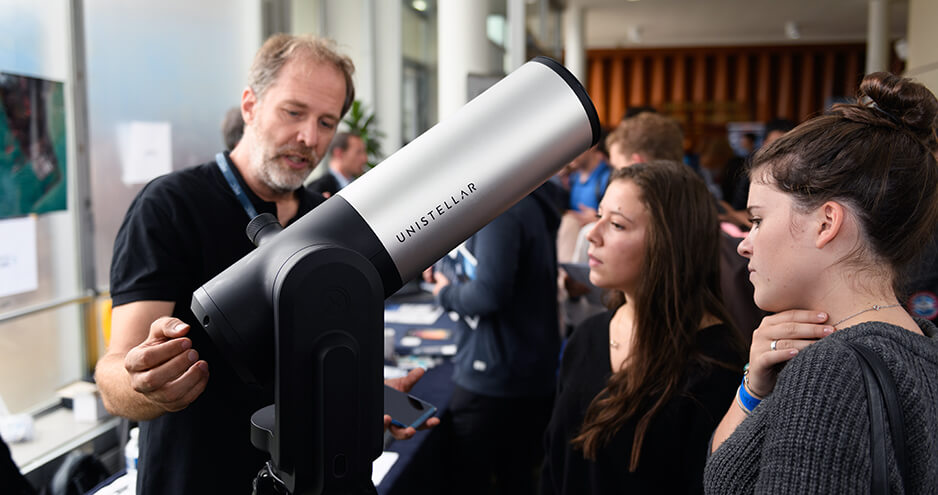
Overall, the startups present at the forum have enjoyed rapid growth over the past five years. “We’re looking to hire 15 people in 2020 and possibly 30 in 2021” said Laurent Marfisi, CEO at Unistellar, a Marseille-based firm involved in high-end astronomy.“They can be in communications, marketing, commercial studies or engineering – but they must share a passion for space and innovation.” At the next stand, Earthcube was looking to recruit graduates with double diplomas. “We’re a monitoring platform combining AI techniques in both computer vision and machine learning,” explained data scientist Tugdual Ceillier. “The students here have the ideal international and broad profiles we’re trying to hire.”
All present at this landmark event seemed to be heeding the warning by Stephen Hawking 18 years ago: “I don't think the human race will survive the next thousand years, unless we spread into space. There are too many accidents that can befall life on a single planet. But I'm an optimist. We will reach out to the stars.”
Read also: "Thomas Pesquet: Checking Earth's Pulse"